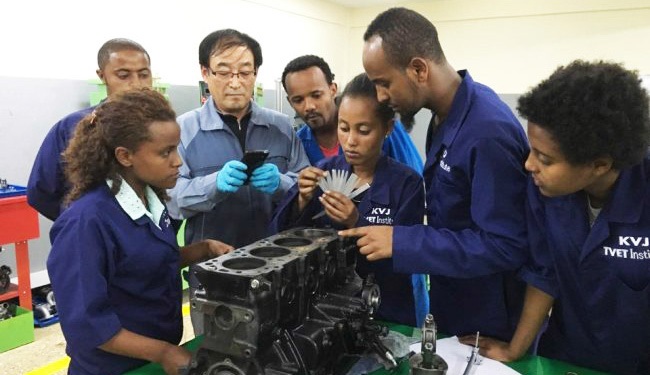
According to United Nations Conference on Trade and Development report, nowhere else in the world is radical economic transformation more urgent than in the least developed countries which have the challenge of accumulating productive capacities at an unprecedented speed, in the face of the rapid reorientation of global production and digital transformation, to achieve the Sustainable Development Goals.
The center of radical economic change is transformational entrepreneurship. Transformational entrepreneurship generates many of the social and economic innovations that underpin sustainable development.
Transformational entrepreneurs create new products and business models; they offer dignified employment; their success leads to broader improvements in the quality of life and even bolsters fiscal sustainability. Dynamic entrepreneurs also make a greater contribution to wealth accumulation and distribution.
TVET centers are places where innovation and entrepreneurship are produced. Nations that give attention to TVET have showed a radical economic transformation and are able to dominate the global economy. At the same time, those who did not are still lagging behind.
According to Professor Hirut Woldemariam, Minister of Science and Higher Education, the experience of developed nations has witnessed how effective TVETs were in times of economic crisis. TVETs were the right choice to reboot their economy. Professor Hirut indicated that inclusive platform among stakeholders has key role in addressing unemployment and other issues.
Creating employment opportunity is not something that should be left to the government or other agent. It is the responsibility of every citizen. Since TVETs are best places to produce skilled man power to the growing economy, there needs to be an active involvement of every Ethiopian.
“Strong work force is the key towards changing the existing system.” said Professor Hirut. High valued and specialized skills, innovations and productivity of industries as well as entrepreneurship and continued skill development are keys to tackle economic stagnancy. However, here in Ethiopia TVETs were considered as the most unattractive engagements.
“So, we need to promote TVET parallel to other institutions along with tertiary education. Ethiopia has taken TVET sector as a national agenda and given main attention. The system will encourage strong linkage between TVET, universities as well as industries.”
TVET was started to be offered in schools in Ethiopia around 1940s. In 2008, Ethiopia made a big reform in the area of TVET system that shifted from input based to demand driven one. The current TVET strategy is devoted to support the new reform and tremendous achievement is recorded within the last ten years, according to her.
Negative attitude among the society towards craftsmen has crippled traditional skills. The poor attitude towards crafts men might have discouraged occupations such as pottery, metal works, leather works and others. This had negatively contributed for the development of skills in the nation.
Vocationalization of basic education is the other area that is given priority by the government. This system will encourage young students to be attracted by TVET and enable them to become future innovators and industrialists of the nation.
Strong attachment of TVET with private sector is one of the remedies to make TVETs more successful and effective in the national economic transformation.
The role of incubation center is vital in producing entrepreneurs. In an exclusive interview with The Ethiopian Herald once, Entrepreneur Dr. Eleni Gebre-Medhin, said that the nation has to create innovation space or startup spaces where the youth can freely do experiments.
“We should also give them a chance to fail and get up again until they succeed. Researches indicated that by 2013 the global work force will increase into 3.5 billion. However, there will be under supply up to 40 million highly skilled workers. This is a good indication that the demand and supply sides must be matched or come into some points where there could not be an exaggerated gap.”
Currently, in Ethiopia there are more than 1,400 TVET colleges. There are more than 20,000 TVET teachers teaching government owned colleges. Every year, more than 300,000 TVET trainees join regular TVET programs.
As the TVET is playing significant role in the overall development of the nation, the issue of quality is the other prime focus of the government. Seeing the role of TVET for the overall economic development of the nation, particularly, its vital role in job creation, quality should be the center of the system.
The Ethiopian Herald, August 14/2019
BY LEULSEGED WORKU





